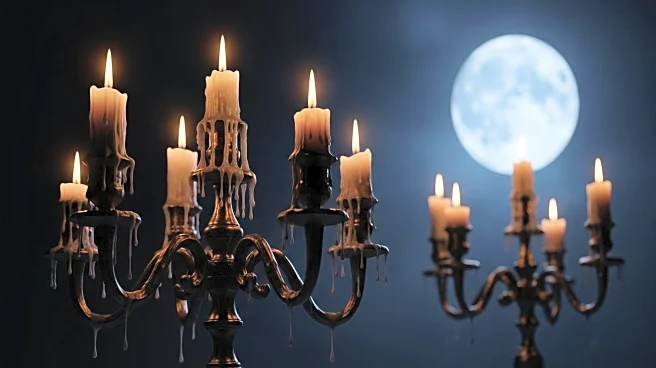What's Happening?
Werner Herzog's 1979 remake of the 1922 film 'Nosferatu' is a significant milestone in the evolution of cinematic vampires. The original 'Nosferatu,' directed by F.W. Murnau, is considered one of the most iconic horror films, despite initial legal challenges that led to attempts to destroy all copies. The film's survival and subsequent influence on vampire lore, particularly the concept of vampires being destroyed by sunlight, have been pivotal in shaping the genre. Herzog's version, along with a recent 2023 remake by Robert Eggers, continues to explore the artistic vision and suspense that the original film introduced. The evolution of vampires in cinema reflects societal fears and anxieties, with the character often representing transgressive figures operating outside societal norms.
Why It's Important?
The remakes of 'Nosferatu' by Werner Herzog and Robert Eggers underscore the enduring appeal and adaptability of vampire mythology in cinema. This evolution is significant as it mirrors changing societal fears and cultural dynamics, with vampires often symbolizing 'the other' or representing darker aspects of human nature. The continued interest in vampire films highlights their ability to address contemporary issues such as colonialism and racism, as seen in recent successful films like 'Sinners.' The genre's adaptability ensures its relevance across generations, providing filmmakers with a rich narrative framework to explore complex themes and engage audiences.
What's Next?
The ongoing interest in vampire films suggests that filmmakers will continue to explore and reinterpret vampire mythology to address modern societal issues. As new adaptations and remakes emerge, they are likely to incorporate contemporary themes, potentially influencing public discourse on topics such as identity, fear, and societal norms. The success of recent films like 'Sinners' indicates a growing appetite for innovative storytelling within the horror genre, which may lead to more diverse and culturally relevant narratives in future vampire films.
Beyond the Headlines
The evolution of vampire films reflects broader cultural and ethical dimensions, including the portrayal of marginalized groups and the exploration of taboo subjects. As vampire narratives continue to evolve, they may challenge traditional norms and provoke discussions on identity, sexuality, and power dynamics. The genre's ability to adapt and remain relevant suggests that it will continue to serve as a lens through which filmmakers can explore and critique societal issues, potentially leading to shifts in cultural perceptions and attitudes.









